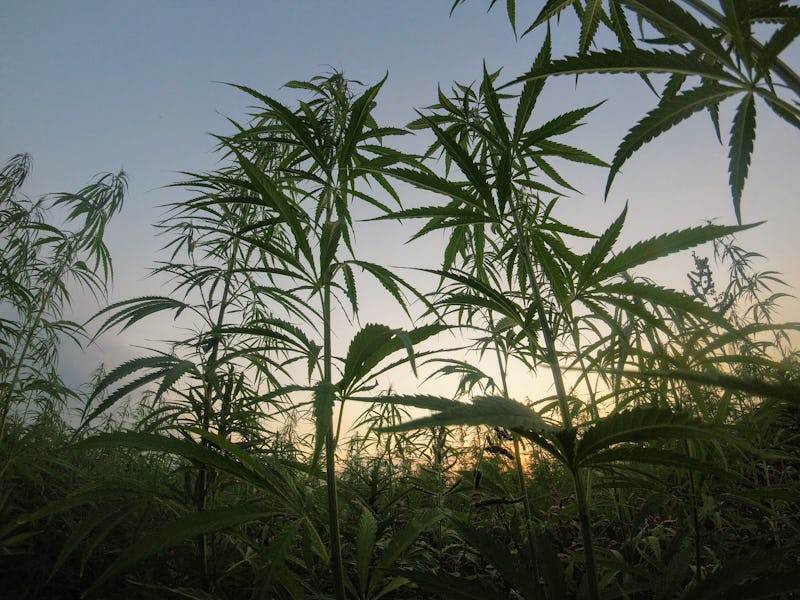CBD as an Antibiotic? What Scientists Are Studying Right Now
Antibiotic resistance is a "global health crisis."

Depending on who you ask, CBD seems to be the cure for what ails you, no matter what’s wrong. Trouble sleeping? Take CBD. Got inflammation? CBD! Now we can add bacterial infections to that growing list, and there’s even evidence to back it up.
In a presentation on Sunday at the 2019 meeting of the American Society for Microbiology, Mark Blaskovich, Ph.D., presented evidence that CBD can kill several types of bacteria. Blaskovich, a senior research chemist at the University of Queensland’s Institute for Molecular Bioscience, demonstrated that not only could CBD kill bacteria, but it could even kill some strains of bacteria that are resistant to conventional antibiotics. The research has not yet been published.
Antibiotic resistance is a growing concern in healthcare, one that the World Health Organization called a “global health crisis” as far back as 2015. And recent research has suggested that antibiotic-resistant bacteria hang out in lots of dark corners of hospitals, including privacy curtains, so any tool that could aid in fighting infections without contributing to the resistance problem would be a huge deal for public health.
CBD is showing up everywhere, from cocktails to lubes. New evidence suggests it could be a crucial tool in the fight against antibiotic resistance.
Blaskovich treated a range of microbes with CBD, including Staphylococcus aureus, Streptococcus pneumoniae, and Enterococcus faecalis — all of which can produce diseases, infections, or both. He reports that CBD killed all of these bacterial species. It even killed several strains that were resistant to conventional antibiotics, including the dreaded MRSA (methicillin-resistant S. aureus), a common source of serious hospital-acquired infections.
Furthermore, the results showed that CBD didn’t seem to induce antibiotic resistance in the bacteria tested. This particular finding will need to be confirmed with further research, of course, but for now, these early results are promising signs that CBD could aid in the global fight against drug-resistant “superbugs.”
At this point, it might be quicker to make a list of the conditions people haven’t claimed CBD can treat. It seems like every day there’s a news article or product endorsement saying the molecule can do it all.
That being said, cannabidiol, the minimally psychoactive component of cannabis, has some good reason to be hyped up. For some conditions, like certain seizure disorders, CBD has proven to be an extremely safe and effective treatment. And for other conditions, anecdotal reports have pushed forward the scientific community’s efforts to explore the molecule’s reported benefits.
While Blaskovich’s research will need to be confirmed and replicated before it can be praised as a cure for antibiotic-resistant infections, it seems like we can mark one more point in favor of CBD.
Abstract:
Background: Infections caused by drug-resistant Gram-positive bacteria affect millions of people and cause tens of thousands of deaths in North America alone. New antimicrobial agents are urgently needed, particularly novel structural classes with new mechanisms of action that can overcome resistant strains. Cannabidiol, the main non-psychoactive component of cannabis, has found increasing attention for a range of medical conditions, including epilepsy and inflammation. Here, we assess the antimicrobial activity of synthetically-produced cannabidiol, free from isolation-dependent impurities that may confound biological testing results obtained with plant extracts.
Material/methods: Cannabidiol was tested in a suite of standard antimicrobial assays, starting with broth microdilution assays against a range of aerobic and anaerobic Gram positive bacteria. Time-kill, resistance induction, and biofilm disruption experiments were also conducted, along with assessment of in vivo activity against MRSA in a murine neutropenic thigh infection model.
Results: Cannabidiol was remarkably effective at killing a range of Gram-positive (but not Gram-negative) bacteria, with broth microdilution MICs similar to clinical antibiotics such as vancomycin and daptomycin. Notably, activity was retained against-resistant strains of S. aureus (MRSA, VISA, VRSA), Streptococcus pneumoniae (MDR) and E. faecalis (VRE). Cannabidiol was bactericidal, showed low levels of propensity to induce resistance, and was active against MRSA biofilms.
Conclusion: Cannabidiol possesses surprisingly effective activity as an antibiotic, comparable to widely used antibiotics for Gram positive infections such as vancomycin and daptomycin, but with retention of activity against bacteria that have become resistant to these drugs. Given cannabidiol’s documented anti-inflammatory effects, extensive safety data in humans, and potential for oral delivery, it is a promising new antibiotic. The combination of inherent antimicrobial activity and potential to reduce damage caused by the inflammatory response to infections is particularly attractive.